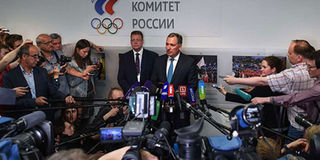Breaking News: At least 10 feared to have drowned in Makueni river
New Russian Olympic chief pledges to 'restore trust'

Newly elected president of the Russian Olympic Committee (ROC) Stanislav Pozdnyakov addresses the media following his election in Moscow on May 29, 2018. PHOTO | YURI KADOBNOV |
What you need to know:
- The Kremlin has however consistently denied a report by the World Anti-Doping Agency (Wada), which accused Moscow of state-sponsored doping between 2011 and 2015, including at the Sochi 2014 Winter Olympics.
- Yet senior Russian sports officials have admitted to "some unacceptable manipulations of the anti-doping system" and the existence of a "systemic doping scheme" in a letter to international sports leaders last week.
MOSCOW
The new head of the Russian Olympic Committee, former fencer Stanislav Pozdnyakov, pledged Tuesday to take "concrete steps" to "restore trust" in doping-tainted Russian sport.
"Restoring trust in our sport depends on concrete steps. All events will take place under the auspices of the International Olympic Committee," Pozdnyakov said after he was elected to the position, Russian agencies reported.
"We will pay the closest attention to restoring trust in our sport. The participation of our team in its entirety in the Olympic Games is among our priorities," added Pozdnyakov, who won five Olympic medals in fencing.
Russia was banned from participating in the Pyeongchang Winter Olympics earlier this year over what international authorities believed to be a state-sponsored cheating programme.
In a statement ahead of the vote, President Vladimir Putin called for sports officials to restore Moscow's place in international sport.
"It is important to ensure the restoration of our position in the international sports movement, to actively participate in the work of international federations and to continue working on improving the effectiveness of anti-doping systems," Putin said in a statement published on the Kremlin's website Tuesday.
He added that "it is necessary to give priority to the formation of an absolute no tolerance culture to this negative phenomenon at all levels of sports training".
The Kremlin has however consistently denied a report by the World Anti-Doping Agency (Wada), which accused Moscow of state-sponsored doping between 2011 and 2015, including at the Sochi 2014 Winter Olympics.
Yet senior Russian sports officials have admitted to "some unacceptable manipulations of the anti-doping system" and the existence of a "systemic doping scheme" in a letter to international sports leaders last week.
It was signed by Russian minister of sport Pavel Kolobkov, outgoing Russian Olympic Committee (ROC) president Alexander Zhukov and Russian Paralympic Committee president Vladimir Lukin.
The letter described the doping as "systemic" but does not use the word "institutional", a key conclusion of the WADA inquiry led by Richard McLaren, who found that Russia's FSB security service was involved in manipulating urine samples at the Russian-hosted 2014 Sochi Olympics.
Vitaly Mutko, who was named as one of the architects of the state-sponsored cheating programme and had overseen sports as a minister and deputy prime minister, lost that brief in a government reshuffle earlier this month.





